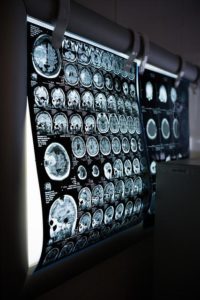Traumatic brain injuries (“TBI”) are a major cause of disability and death in adults. TBIs occur when a sudden, external, physical assault damages the brain. One common cause of TBIs: Car crashes.

When a TBI results from a car crash, the injury is most frequently a closed brain injury. This results in bruising and tearing of brain tissue and blood vessels.
Like many injuries, TBIs range in severity. TBIs can be focal (confined to one area of the brain) or diffuse (involving multiple areas of the brain) and can cause injuries ranging from mild concussion to severe injury resulting in permanent disability or death.
 What are some symptoms of traumatic brain injuries?
What are some symptoms of traumatic brain injuries?
Just as they range in severity, TBI symptoms do not always manifest the same. Individuals who have suffered from brain injury may experience one or more of the following:
- Cognitive deficits – i.e. confusion, problem-solving difficulty, shortened attention span, amnesia;
- Motor deficits – paralysis or weakness, poor balance, decreased endurance;
- Language deficits – difficulty speaking or understanding speech (aphasia), difficulty reading (alexia), difficulty writing (agraphia);
- Functional deficits – difficulty performing activities of daily living (dressing, eating, bathing), problems with organization, inability to operate a motor vehicle;
- Social difficulties – impaired social capacity
- Regulatory disturbances – fatigue, dizziness, headache
- Personality or psychiatric changes – irritability, decreased motivation, anxiety and depression
- Traumatic epilepsy
For a more complete list of the possible effects of brain injury, click here.
Will a brain scan tell me whether I have a traumatic brain injury?
Given that TBIs cause direct injury to the brain, you might expect that those injuries would necessarily be seen on brain scans, but that isn’t always the case. TBIs affect the brain in two major ways: (1) bruising or tearing of brain tissue; (2) injury to microscopic nerve fibers (axons), which connect nerve cells in the brain (neurons).
Because TBIs can result in microscopic injury to the brain, it may go undetected by MRIs and/or CT scans. But that does not make the injury any less real.
I’ve been diagnosed with a traumatic brain injury – what now?
If you’ve suffered a TBI and are experiencing one or more of the symptoms above, you may be wondering: Is there anything I can do to help my brain recover? And will I ever get back to normal?
As you might expect, the prognosis for mild a TBI is typically better than for a more moderate or severe TBIs. With a mild TBI, like a concussion, you may be fortunate enough to recover most or all brain function over the course of several months without much intervention. For moderate to severe TBIs, injured persons may benefit from interventions like neurosurgery, occupational/physical therapy, speech/language therapy, psychological services, and/or social services.

Emergency care for moderate to severe TBIs focuses on “making sure the person has enough oxygen and an adequate blood supply, maintaining blood pressure, and preventing any further injury to the head or neck.” Medications like anti-seizure drugs, diuretics, and in severe cases, coma-inducing drugs, may be used to help limit secondary damage to the brain. For some patients, emergency surgery may be necessary to remove clotted blood, repair skull fractures, stop a brain bleed, or relieve pressure inside the skull.
Following emergency care, many patients (most who have had a severe brain injury) will have long-term effects of TBI and require rehabilitation to relearn basic skills and improve the performance of daily activities. Rehabilitation specialists may include:
- Occupational therapist
- Physical therapist
- Speech and language therapist
- Neuropsychologist
- Social worker or case manager
- Rehabilitation nurse
- Recreational therapist
- Vocational counselor
- Psychiatrist
If you or a friend or loved one have suffered a TBI at no fault of your own, call us for a free consultation with a traumatic brain injury lawyer at 866-388-1307. Our traumatic brain injury attorneys are here to help.




